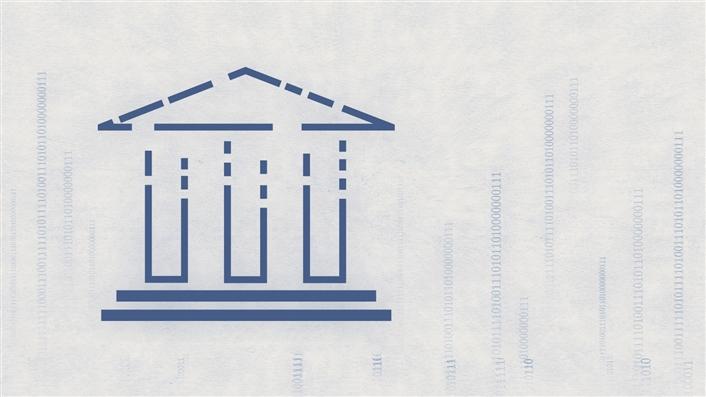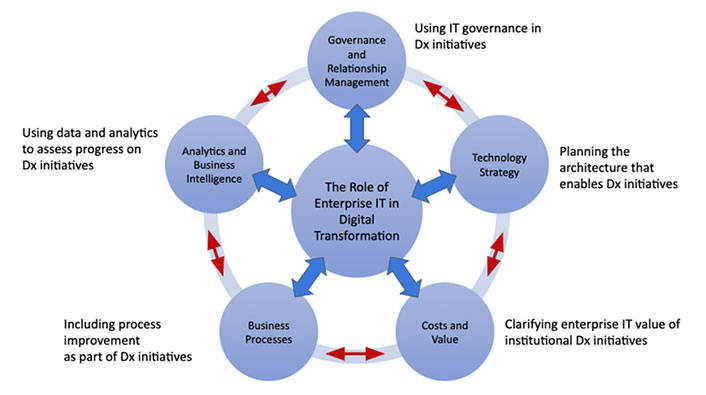Each year the Enterprise IT Program selects a lens through which to view enterprise IT challenges. In 2019 we're looking at the role of enterprise IT in the evolving world of digital transformation.

Each year the Enterprise IT Program selects a lens through which we examine five enterprise IT themes:
- Governance and Relationship Management
- Technology Strategy
- The Cost and Value of Enterprise IT
- Business Process Management
- Analytics and Business Intelligence
In 2016 we looked at the impact of cloud services on higher ed enterprise IT, including the need to develop more flexible sourcing strategies, adjust IT budgets, and improve communication. In 2017 we considered integrations and partnerships. We looked at issues around data integration across the increasing complexity of IT systems, and we examined ways IT can integrate with the rest of the institution through partnerships and cross-enterprise efforts. In 2018 we turned our attention to next generation enterprise IT and how that mission-focused, client-centric thinking impacts the program's theme. Visit the Enterprise IT Program webpage to find resources associated with those challenges and more.
The 2019 program focus builds on the next generation enterprise IT concept, taking it a step further. Our next generation enterprise IT work introduced the idea of a tight alignment between IT goals and institutional mission. This alignment and focus on institutional strategy is a hallmark of digital transformation, our Enterprise IT focus for 2019.
You'll see digital transformation (or Dx) appearing across EDUCAUSE programs and resources this year. A 2018 EDUCAUSE task force on digital transformation recommended ways that EDUCAUSE can begin to help support our members through their own transformations, and we will be acting on those recommendations in 2019. The task force report describes a major shift in higher education and includes this definition of digital transformation:
Digital transformation is a cultural, technological, and workforce shift. In its cultural dimension, it requires a new approach to how campus leaders interact with each other as well as an emphasis on change management and a movement toward institutional agility and flexibility to meet quickly changing needs. For IT, this means adopting a role of strategic and transforming partner in alignment with institutional mission. IT leaders and their organizations must model digital transformation by adopting innovative practices and creating new digital architectures that provide unprecedented agility and flexibility to enable the institution to rapidly and efficiently achieve its strategic aims. Digital transformation also has broad implications for the institutional workforce, requiring dramatic shifts in workplace skills at all levels and professional development that enables the workforce to keep pace with the rapid tempo of change.
Digital transformation is being driven by technology trends and changes that include advances in analytics, artificial intelligence, the cloud, mobile, consumerization, social networks, and storage capacities. Those drivers are enabling a new approach to everything from digital architectures to how campus leaders interact with the IT organization, all with the expected outcomes of new business models, improved student outcomes, different teaching and learning methods, and new research capabilities.
It seems clear that digital transformation is going to bring a shift in how enterprise IT systems and services are managed and delivered. Enterprise IT leaders are in a position to play an important role in their institution's digital transformation initiatives, and that expanded role starts with the development of a clear connection between the institution's Dx goals and the work of the IT department. This evolution in enterprise IT thinking can be seen as an opportunity for the IT organization to act as a strategic partner in the institution, going beyond the delivery of technologies and services to the integration of technology throughout the institution, adding value in direct relationship with the institution's Dx goals. A focus on the value that technology brings to institutional strategy and goals results in a symbiotic relationship in which technology not only serves but also shapes strategic ambitions. In this evolving environment, information technology becomes mission-centric and client-focused, positioning the college or university to integrate digital technology into every area of the institution in a way that increases value across all aspects of the higher education mission.
In 2019 we will consider digital transformation as it relates to each of the program themes (see figure 1).

As the figure shows, the Enterprise IT Program themes are all interconnected. Although we address them in linear fashion, they each inform the others and should be considered as pieces of a whole.
In 2019 we will remove sourcing strategies as one of our main themes, addressing it instead as part of the technology strategy theme. And we'll add a new theme to the Enterprise IT list, that of governance and relationship management. The addition of this theme is a recognition of the important role that both IT governance and relationship management play in Dx efforts. Digital transformation brings significant change not only to technology but also to institutional culture and workforce. Arguably, transformation is not possible without the kind of close attention to culture and workforce that will make change possible in those arenas. In 2019 we'll be looking at the importance of IT governance in enterprise IT activities that support institutional Dx initiatives.
IT needs to play a leading role in creating the type of technology environment that can enable digital transformation, requiring the development of a forward-thinking technology strategy. As technology shifts and advances in ways that enable digital transformation, focus needs to turn to the development of a flexible and agile technology environment that enables the institution to make quick shifts in response to rapidly changing needs. This is not business as usual. Developing this kind of technology strategy requires close collaboration, understanding, and buy-in with stakeholders across the institution as well as IT staff. We'll be looking at the importance of getting stakeholders on board with a technology strategy that enables and supports digital transformation.
Enterprise IT is expensive, and it's not always easy to explain the value these systems bring to the institutional mission and goals. Digital transformation presents a new opportunity for IT leaders to demonstrate the value of enterprise systems through close alignment of IT goals and Dx initiatives. IT leaders should use this opportunity to communicate with their institutions about the costs and value of enterprise services by describing the value in ways that show the connection to specific institutional Dx goals. We will put together resources to help meet that challenge of defining value in enterprise IT.
In 2018 we looked at ways to optimize business processes and the importance of working in partnership across the institution for business process change. A business process redesign effort can result in efficiencies and increased institutional effectiveness. This year we'll consider how business process redesign efforts can promote digital transformation initiatives through a focus on change and evolution.
Finally, we'll turn our attention to analytics and business intelligence, with a look at how data and analytics can be used to assess progress on institutional digital transformation efforts.
As enterprise IT evolves to better enable and support institutional Dx efforts, enterprise IT strategy needs to evolve along with it. Throughout the year, the Enterprise IT Program will provide new resources that help institutions understand and manage the challenges and opportunities of the program's themes. In addition, the program's web pages will provide links to a curated selection of relevant materials from the EDUCAUSE library, other EDUCAUSE program areas, and our partner associations such as NACUBO, AIR, and AACRAO.
If you have a story to tell about your own institution's work in the area digital transformation, or if you have suggestions or questions about the program, please contact Betsy Tippens Reinitz.
Betsy Tippens Reinitz is the director of the Enterprise IT Program for EDUCAUSE.
© 2019 Betsy Tippens Reinitz. The text of this work is licensed under a Creative Commons BY-NC-ND 4.0 International License.
